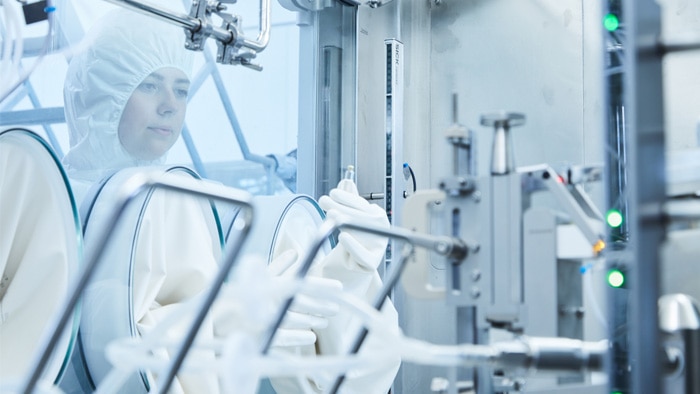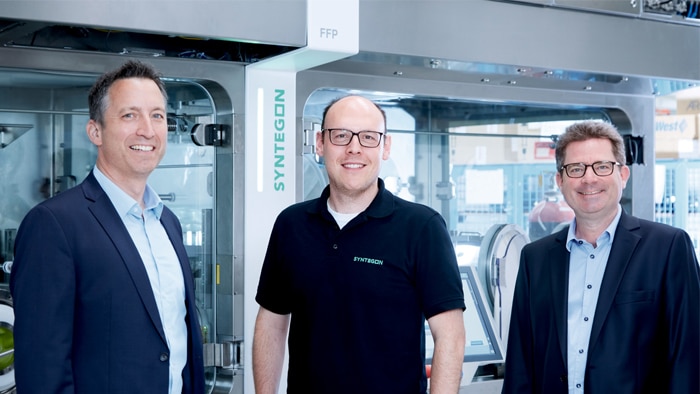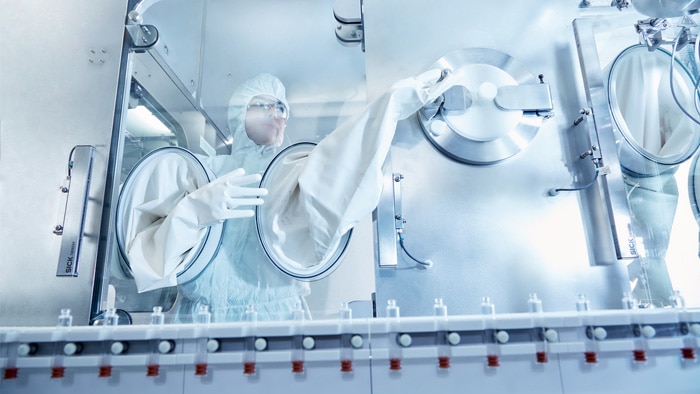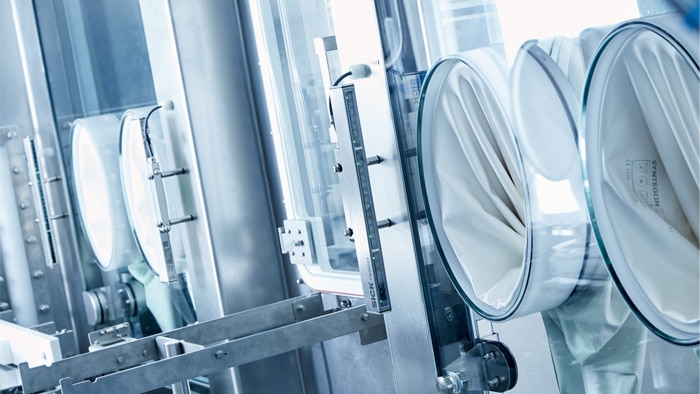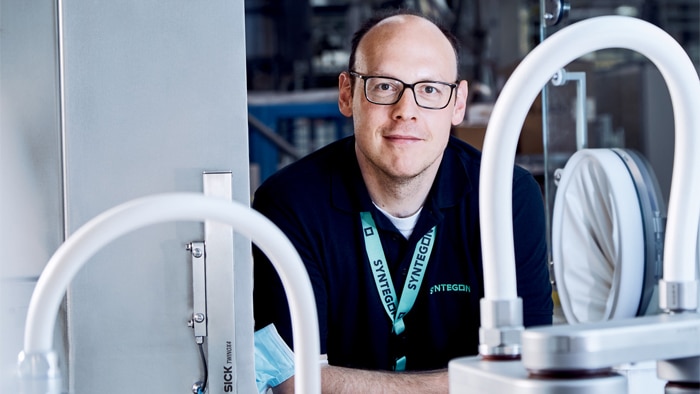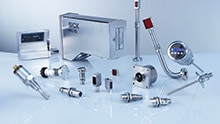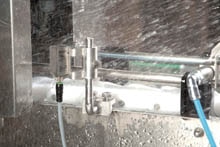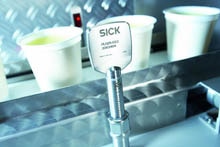In an intensive joint development process, SICK and its customer Syntegon Technology successfully designed the ideal light grid for the demanding sterile processes in the pharmaceutical industry. When used with isolators and restricted access barrier systems (RABS), the TWINOX4 is now ensuring smooth cooperation between man and machine.
“Form follows function” – hygienic design for the Champions League
When taking medicine, have you ever wondered how it was produced and packaged? When it comes to product safety, pharmaceutical companies go to extreme lengths to ensure that patients as well as production staff feel very safe. This means that the requirements on the advancement of a light grid based on the hygienic design in accordance with EHEDG were very strict for the team working with Marco Kaiser (Strategic Industry Manager, Consumer Goods), Knut Helmer (Key Account Manager, Consumer Goods) and Moritz Zwerger (Product Manager, Light Beam Systems) at SICK AG. Matthias Angelmaier (Global Product Manager, Isolator and Process Technology) and the design and development department at customer Syntegon provided additional support with their design expertise.
Application at the heart of sterility
The experienced specialists know that when it comes to processing aseptic pharmaceuticals or innovative biotech products, sterility is key. For aseptic environments, a reliable hygienic design is absolutely essential to ensure that processes run smoothly. As one of the leading suppliers, process and packaging technology company Syntegon supports the pharmaceutical industry worldwide with its intelligent and sustainable technologies. Isolators and other barrier systems are at the heart of aseptic plant design. Maximum hygiene in the interaction of all components is essential here. Of course, this also applies to the safety technology.
If the plant operator has to intervene in the system, for example to correct a fault or to change the agar plates of the microbiological monitoring system, this is done using glove ports integrated in the barrier system. The machine is first switched to the safe OFF state by means of safety light curtains. Syntegon has put its trust in the TWINOX4, the hygienic advancement of the stainless steel design of the deTec4 Core IP69K safety light curtain from SICK with the plastic housing previously used in the pharmaceutical industry.
Matthias Angelmaier explains why this was necessary: “The materials used in the isolator – almost exclusively glass and stainless steel – allow for optimal cleaning and have high material resistance to H2O2. The nebulized H2O2 is used at regular intervals to treat all areas and surfaces in the isolator to kill all microorganisms in the system and ensure aseptic production. Stainless steel simply has very good material properties for this purpose. We are constantly working to optimize all parts and components of the overall filling machine and isolator system, from the filling hoses to the format parts and the safety light curtains, for the H2O2 applications.”
The ideal form
SICK and Syntegon (known as Bosch Packaging Technology until 2020) have a long-standing partnership in the use of safety light curtains for safe human-machine collaboration. This made it possible for Knut Helmer, Key Account Manager for Consumer Goods at SICK AG, to develop the safety light curtains previously in use into the new hygienic TWINOX4 at SICK in close coordination with Syntegon: “For the new design, we received valuable input from Syntegon, such as detailed requirements for the mechanical construction. As a result, we now have a design free of indentations, with no edges or gaps, both in the TWINOX4 housing and in the sturdy support.” These details matter when dealing with microorganisms, because germs really like areas that are difficult to clean: “The more complex and complicated the surfaces and contours are, the more difficult it is to clean and sanitize them. Areas that are difficult to clean are real problems for the plant employees,” Matthias Angelmaier explains, which is why he is impressed by the new easily-accessible design.
Tests confirm: The TWINOX4 can withstand a lot
Not only accessibility had to be improved, however; resistance to the sometimes highly aggressive cleaning media and H2O2 was also a key issue. In order to achieve really TOP standards here, SICK and Syntegon played it safe by using stainless steel 1.4404 / 316L as the material for the TWINOX housing and support. Although basic guidelines such as “GMP” (Good Manufacturing Practice) were used as starting points, only the best is good enough for highly sensitive drug processing. For this reason, SICK also designed and tested the light curtain for resistance to commercially available cleaning agents. Syntegon examined H2O2 resistance in the laboratory. “The new design can withstand everything used in common pharmaceutical environments and is also maintenance-free,” Angelmaier is pleased to report.
Compact nature of the safety light curtain helps the plant designer
The compact design of the TWINOX4 also helps the safety light curtains fit more flexibly in the system design. The trend toward small-batch production for personalized medicine requires increasingly flexible machine concepts for different packaging materials and requirements. This means space for all the necessary components is getting tighter. “Plant engineers really welcome compact designs here,” explains Marco Kaiser. That means the TWINOX4 can be used in the entire range of pharmaceutical machines at Syntegon, regardless of whether isolator technology, open and closed RABS (restricted access barrier systems) or containments are used.
In accordance with the guiding principle of product design “form follows function,” SICK and Syntegon were able to work together to develop a hygienic design that fulfills the high demands of the Champions League in terms of hygiene. The interaction between material, form, and function of the TWINOX4 is impressive and it supports the look and feel of the high-quality pharmaceutical plants, and it also makes an important contribution to safety in drug production.
Read more
Hygienic Sensor Solutions: Stainless steel makes processes safer
Hygienic Design: System solution for hygienic production
